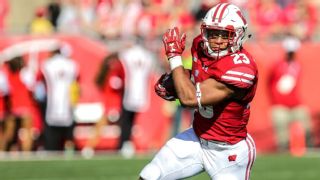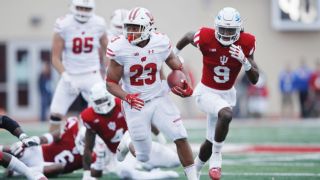|
MADISON, Wis. -- Jonathan Taylor's upcoming summer school load includes a course in astronomy. Wisconsin's biggest star is geeking out about it. "I've been a science guy for a while, and space is definitely interesting, how things form," said Taylor, sitting in Wisconsin's football lobby overlooking Camp Randall Stadium on a cool April morning. "It's not like you breathe regular air. It's a totally different realm. "You don't know what's out there, and it's fun exploring." A year ago, Wisconsin didn't know what it had in Taylor, who in 2017 reached rarefied air at the program's loftiest position: running back. He broke Adrian Peterson's FBS freshman rushing record with 1,977 yards, eclipsed 100 yards in 10 of 14 games with three 200-yard efforts, and finished sixth in the Heisman Trophy voting. An easy choice for Big Ten Freshman of the Year, Taylor earned second-team AP All-America honors and consideration for both the Doak Walker and Maxwell awards. Taylor has the size-speed-power combination to exhaust defenses, but his defining trait is an active, inquiring mind. He's driven to succeed but also to understand what goes into success. He constantly asks questions, not because he knows the answers but because he doesn't. "I enjoy science, so in science, you're always asking why and how," Taylor said. "When it came to football, I definitely wanted to understand defenses, especially when I came to this level. It's imperative to know in the pre-snap reads, you're finding the safety rotations. It's just processing information.  "If you know what's going on, you can apply other situations and tools to that situation." Taylor has always learned this way. His curiosity stood out to teachers at Salem High School in New Jersey, where he became an honor-roll student and participated in the prestigious International Baccalaureate program, drawing interest from Power 5 schools and Ivies alike. He took courses like critical thinking, where students brainstormed questions to spur big-picture discussions in a Socratic seminar format. "We talked about how you know what you know," said Sally Lamont, Taylor's teacher for critical thinking. "We would discuss: What is the purpose of knowledge? Deep stuff. He really liked those kinds of discussions. He liked to talk about Neil deGrasse Tyson and Stephen Hawking. He liked both of them and wanted to explore them more." For his I.B. chemistry final, Taylor studied forensics, comparing the characteristics of fingerprints used to make identifications. For his I.B. literature final, he analyzed the Tao Te Ching, an ancient Chinese text that shaped much of Eastern philosophy and religion. Most students wanted no part of the Tao. Taylor dove in. "It forces you to think in ways that are unconventional and maybe a little bit creative," said Regina Ilaria, Taylor's literature teacher. "He seemed to actually really enjoy it. It tells you about his independence." Taylor, whose love for science began as a sixth-grader, thrived in I.B. chemistry. He would listen intently as his teacher, Louise Jakub-Cerro, explained mathematical formulas and how they related to theories. After Jakub-Cerro finished, Taylor would ask detailed questions. Only after fully understanding a concept would Taylor jot down notes. "It's very unique," Jakub-Cerro said. "Usually when you're talking to the class and giving them information, they're trying to get started on a problem or trying to write down everything you're saying. I don't think I've had anybody who really waits and listens like he did. "It feeds right into those people who go into science. It fuels science, that curiosity." Taylor has the same thirst with football and understanding what will take his game to the next level. When he arrived at Wisconsin, he constantly asked questions of coaches and teammates. He even peppered former Badgers running backs and fellow South Jersey natives Corey Clement and Ron Dayne -- the team's last Heisman Trophy winner -- for advice on how to play consistently well. Being in a room filled with older running backs and a veteran coach, John Settle, didn't stop Taylor from speaking up. "He knew he'd be better off asking a question than not knowing what to do," running back Garrett Groshek said. "He's trying to be a scientist when it comes to playing football. He's just trying to ask everything he can and learn as much as he can." This spring, Taylor entered what Wisconsin coach Paul Chryst calls the "why" phase. Taylor knows what his basic responsibilities are and how to execute them but wants to know why a certain route works against a particular defensive look, or why a teammate's responsibilities change based on a pre-snap look.  "He's really good at doing that, which is also brave, and maybe that's because there's some confidence," Chryst said. "How many guys try to just hide? You don't feel challenged by him. It's definitely not that why. It's why this fits off of this. It's putting the pieces together." The missing pieces for the 5-foot-11, 216-pound Taylor include improved ball security (eight fumbles, six lost in 2017), a bigger role in the passing game (eight receptions in 2017) and staying on the field as an every-down back. This spring, Taylor and Groshek spent chunks of practices with Chryst, working on catching passes and how they'll be defended on certain routes. Chryst and offensive coordinator Joe Rudolph are mindful of Taylor's workload -- his 299 carries in 2017 ranked fourth nationally -- but they're comfortable with using him on more third downs, not merely because of his ability but his proficiency. While some young running backs spend most of their film-room time studying long rushes and what goes into them, Taylor calls Rudolph, asking him to explain subtle differences in protections. "You're like, he really wants to gain an understanding that's a little bit different. He does see a bigger picture to what we're doing and what he's going to be asked to do," Rudolph said. "I said it from the beginning: He showed a maturity that you don't often see and really carried responsibilities that I don't remember many young guys carrying here." Salem High coach Montrey Wright saw maturity in Taylor at an even younger age. He was the kid who needed schematic concepts explained only once, who knew not only his responsibilities but those of every other player. Wright typically pushes a handful of Salem's football players toward the school's I.B. program. Taylor was an obvious choice. "He was doing things the average kids his age weren't doing," Wright said. On the field, Taylor bloomed a bit late. His rushing total spiked from 500 yards as a sophomore to 1,383 as a junior to 2,815 -- breaking Clement's single-season state record -- as a senior in 2016. When coaches began visiting Salem High to see Taylor and watch game film, the running back would always ask them: What do you think I need to work on? "Coaches would look at him like, 'This is amazing. This kid has great film and he's asking how to get better,'" Wright said. "He wants to soak in as much information as possible. He's always been about the next challenge. He knows that knowing a lot and doing what he's doing goes a long way." Taylor is still locked in on the next challenge, but he also appreciates how his life has changed. Last spring, he was preparing for track meets at Salem High. Now he's the Heisman favorite (according to Bovada), a recognized face around town. He smiles while recalling the elderly couple that stopped him by Union South, Wisconsin's student center, to tell him they had season tickets and loved watching him play. "It was flattering," he said. "It's definitely fun walking around. During this time last year, [I was] just a track guy. People recognize your face and know your name now. That just comes with setting yourself to a higher standard." Judging by Taylor's past, the standard will be met. When he sat down with Settle to review last season, they agreed on two things: Taylor's accomplishments as a freshman were extraordinary, and he has a lot of room to grow. "I can see it," he said. "I wanted to gain more knowledge." Taylor's winter was all about upgrading physical skills: quickness, agility, strength. The spring was for sharpening football skills. The fall will be about building upon what he started in 2017. But first, the University of Wisconsin's aspiring scientist will study astronomy, a chance to get lost in the stars. Taylor can't wait.
|

